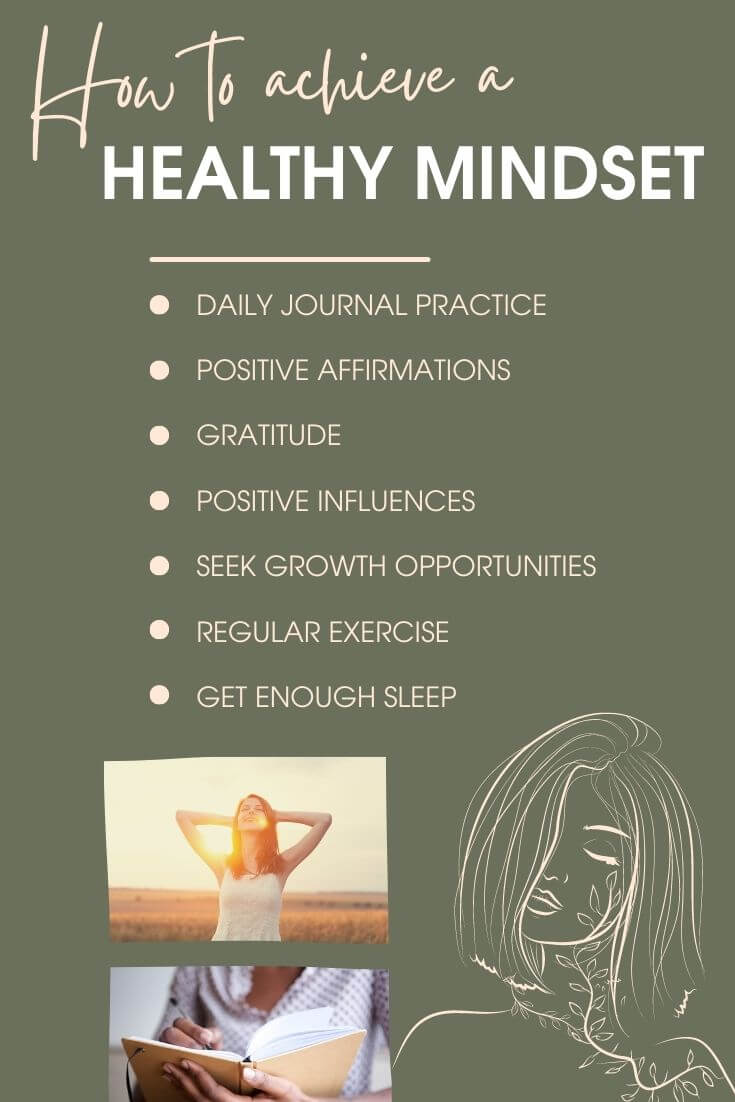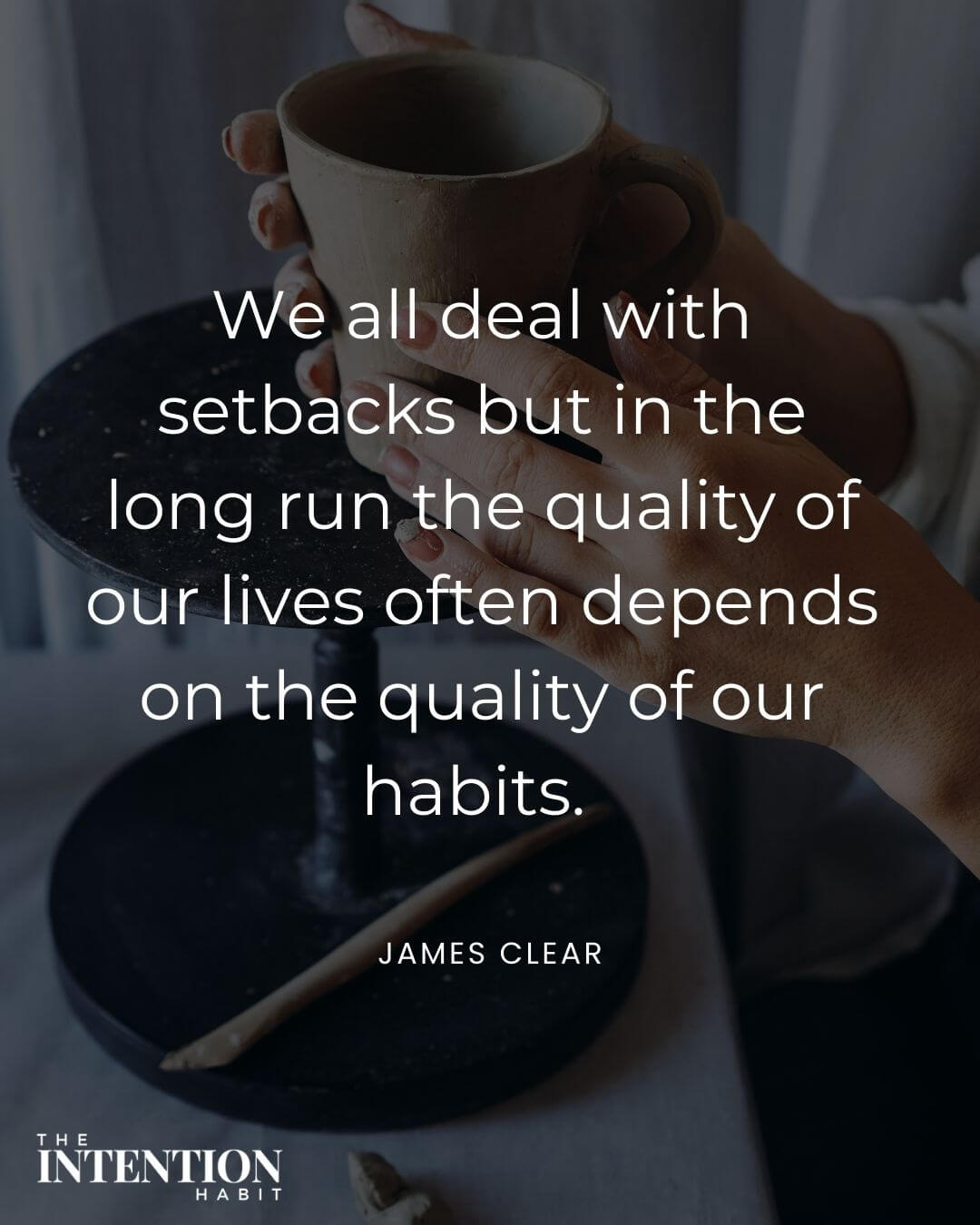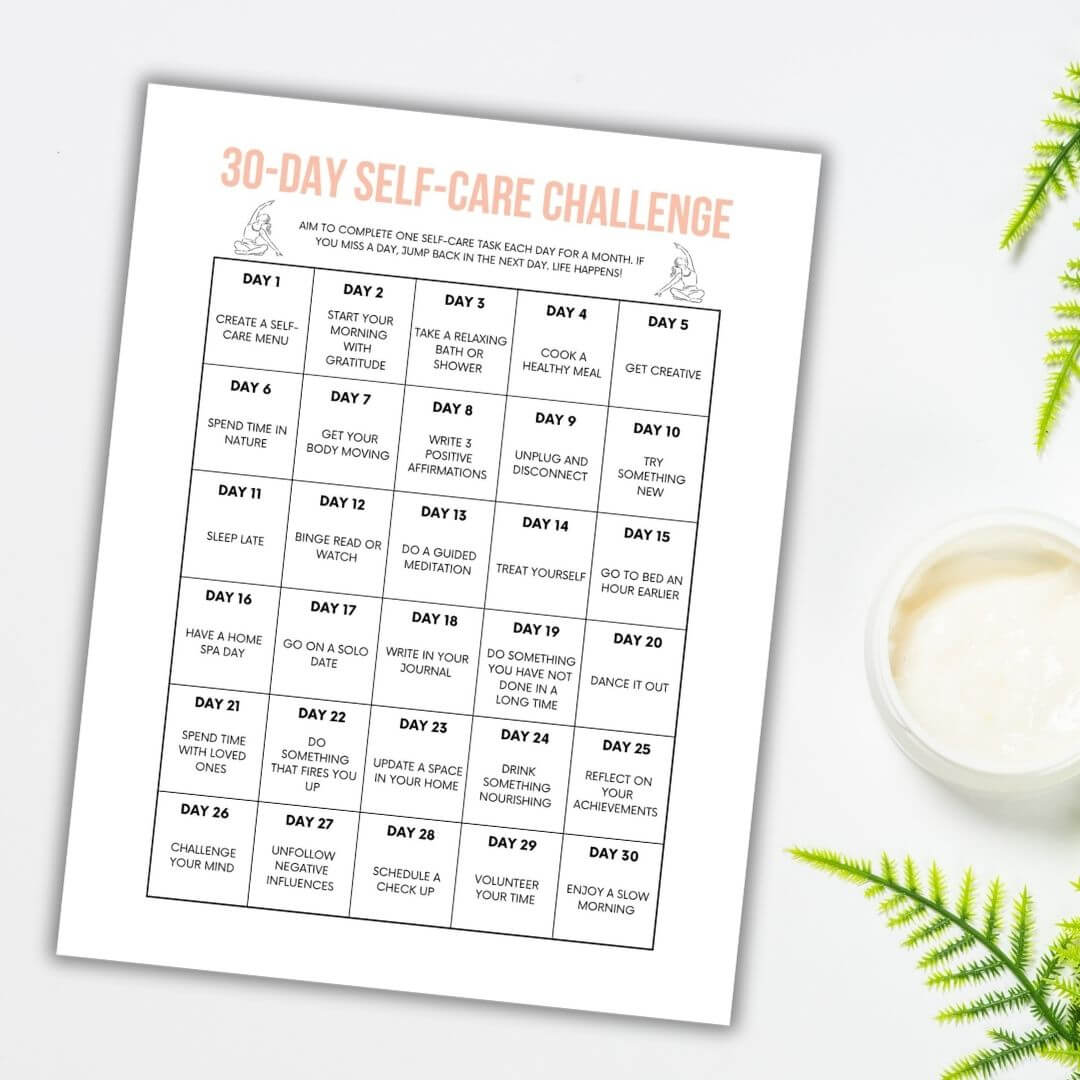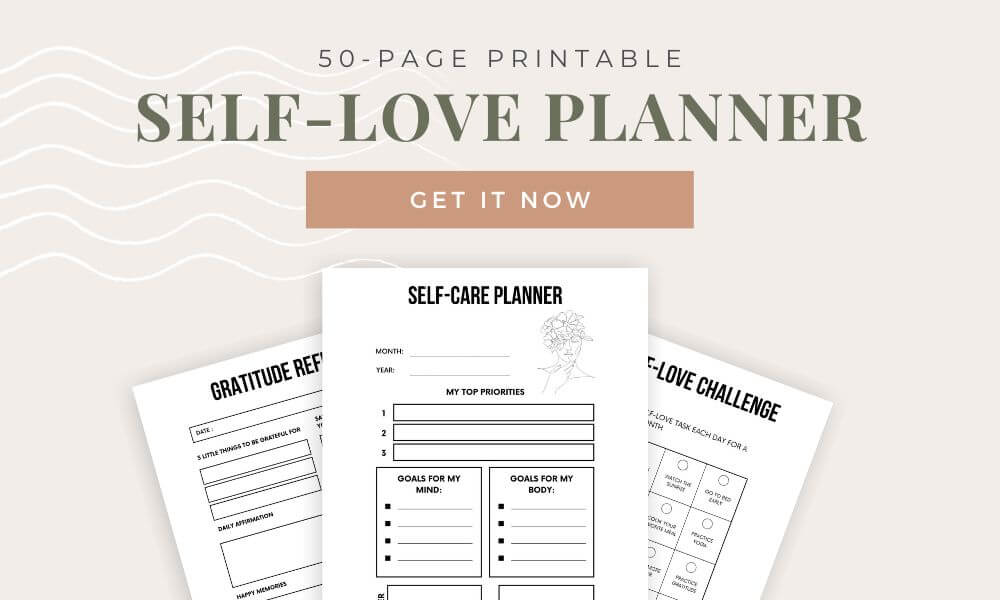20 Healthy Mindset Habits To Improve Your Wellbeing
Are you looking for healthy mindset habits to boost your well-being? In our pursuit of overall wellness, we often focus on physical health, exercise, and nutrition. However, one vital aspect that we mustn’t overlook is our mental well-being.
A healthy mindset forms the foundation for a fulfilling and balanced life. By adopting positive habits and nurturing our thoughts, we can enhance our overall well-being and navigate life’s challenges with resilience and clarity.
In this article, we will explore what a healthy mindset actually is and delve into 20 powerful habits that can transform the way we think and live.
What is a Healthy Mindset?
In the same way that we care for our physical body, through exercise and healthy eating, we also need to support the health of our mind.
Having a healthy mindset is about being aware of our thoughts and feelings and learning how to manage them in a productive way. It’s also about developing an attitude of growth, positivity, and developing mental resilience to help us through tough times.
Understanding The Mind-Body Connection:
A healthy mindset recognises the powerful connection between our thoughts, emotions, and physical body. It acknowledges that our mental state can impact our physical health and vice versa.
It explores the interaction between our psychological processes, such as thoughts and emotions, and our immune system, nervous system, and overall physical health.
Research has shown that negative emotions, stress, and chronic psychological distress can have detrimental effects on our physical health, weakening our immune system and increasing the risk of various health conditions.
Conversely, positive emotions, optimistic thinking, and healthy coping strategies have been linked to better physical health outcomes and improved overall well-being.
By understanding and harnessing the mind-body connection, we can actively nurture both our mental and physical health.
Cultivating Self-Awareness
Self-awareness is the foundation of a healthy mindset. It involves developing a deep understanding of our thoughts, emotions, beliefs, and behavioural patterns.
By being aware of our inner world, we can identify self-limiting beliefs, negative thought patterns, and triggers that hinder our well-being.
Through self-reflection and introspection, we gain clarity about our values, needs, and desires, empowering us to make conscious choices aligned with our authentic selves.
Embracing A Growth Mindset
A healthy mindset embraces a growth mindset, which is the belief that our abilities, intelligence, and talents can be developed through dedication, effort, and learning. It fosters resilience, curiosity, and a willingness to embrace challenges as opportunities for growth.
By developing a growth mindset, we free ourselves from the limitations of a fixed mindset and open doors to new possibilities, personal development, and continuous improvement.
These foundational elements of a healthy mindset lay the groundwork for the habits and practices that follow.
Healthy Mindset Habits To Improve Your Life
Now that we’ve taken a closer look at what a healthy mindset is, let’s look closer at how to have a healthy mindset and how to build healthy habits that support a happy, intentional lifestyle:

1. Daily Journaling: Unleashing Creativity And Emotional Release
Daily journaling offers a safe and private space to explore our thoughts, feelings, and experiences. Intentional journaling encourages self-reflection, self-expression, and self-discovery.
Through the act of writing, we can unleash our creativity, gain insights, process emotions, and find clarity amidst the noise of everyday life.
It can also be a really simple way of reorganising our thoughts when things are feeling overwhelming too!
Try these intentional journaling prompts to help you get started.
2. Mindful Breathing: Finding Calm In The Present Moment
Mindful breathing involves intentionally focusing on our breath as a way to anchor ourselves in the present moment. By observing our breath and bringing our attention back to it whenever our minds wander, we cultivate a state of calm, reduce stress and anxiety, and enhance our overall well-being.
3. Positive Affirmations: Harnessing The Power Of Self-Talk
Positive affirmations involve intentionally using uplifting and empowering statements to shift our mindset and cultivate self-belief. By repeating affirmations such as “I am capable” or “I am deserving of love and success,” we can rewire our thoughts and boost self-confidence.
Check out these body positive affirmations for ideas.
4. Gratitude Practice: Fostering A Thankful Heart
Practising gratitude involves intentionally focusing on the positive aspects of our lives and expressing appreciation for them. Regularly acknowledging and reflecting on what we are grateful for can cultivate a sense of joy, contentment, and resilience in the face of challenges.
5. Visualisation: Imagining Your Desired Reality
Visualisation involves using your imagination to vividly picture your desired outcomes and goals.
Visualisation is an effective method used by many professional athletes and performers, but it can be just as effective in other scenarios too. I have used it with many clients during my years working in psychology.
By mentally rehearsing success, you can enhance motivation, boost confidence, and increase the likelihood of achieving your aspirations. Visualisation taps into the power of your mind to shape your reality.
6. Practising Self-Compassion: Treating Yourself With Kindness
Self-compassion involves offering yourself the same kindness, understanding, and support you would give to a loved one.
It means acknowledging your imperfections without judgment and responding to yourself with empathy and care. Self-compassion promotes emotional well-being, resilience, and a healthier relationship with yourself.
Next time you have those negative thoughts creeping in, ask yourself ‘Would I say this to a friend?’. If the answer is no, don’t allow your inner dialogue to talk to you that way either!
7. Surrounding Yourself with Positivity: Build A Supportive Circle
The people we surround ourselves with significantly impact our mindset and well-being.
Choosing to be around positive, supportive individuals who inspire and uplift us can foster a nurturing environment for personal growth and happiness.
Building a network of like-minded individuals who share our values and aspirations creates a sense of belonging and encouragement.
While there are certain people in our lives who don’t bring out our best, we can’t always avoid them, so instead make intentional choices about the friends you do choose.
8. Limiting Negative Influences: Protecting Your Mental Space
Negative influences, whether in the form of toxic relationships, news, or social media, can drain our energy, trigger stress, and hinder personal growth.
It’s crucial to set boundaries and consciously limit exposure to negativity. By protecting your mental space and surrounding yourself with positive and uplifting content, you can preserve your well-being and foster a healthier mindset.
Sometimes this is as simple as unfollowing the Instagram accounts that make us feel like an imposter or choosing not to watch the 6 pm news because it’s full of negative updates.
9. Seeking Growth Opportunities: Embracing Challenges As Learning Opportunities
Growth opportunities exist in every challenge and setback we encounter. Embracing these experiences as learning opportunities allows us to develop resilience, adaptability, and personal growth.
By reframing obstacles as chances for growth and viewing failures as stepping stones to success, we cultivate a growth mindset and open ourselves up to transformative experiences.
10. Engaging In Regular Exercise: Nurturing Your Mind And Body
Regular exercise is essential for nurturing both the mind and body.
Physical activity releases endorphins, improves mood, reduces stress, and enhances cognitive function. It promotes overall improved wellness and helps maintain a healthy balance between mental and physical health.
Aim to do some form of physical activity each day, even if it is a 10-minute walk to get you moving! Find a form of exercise that you actually love and this gets a whole lot easier.
11. Prioritising Rest And Sleep: Replenishing Your Energy
Rest and sleep are vital for rejuvenating the mind and body. Our very existence depends on sleep, so it should be just as important to you as eating and hydrating!
Prioritising adequate restful sleep supports cognitive function, memory consolidation, and emotional and physical health. It allows for the replenishment of energy, enhances productivity, and promotes overall well-being and vitality.
We all know how hard it is to be productive and happy after a poor night’s sleep!
12. Embracing Flexibility: Adapting to Change and Letting Go
By embracing flexibility, you are being open to change and willingly adapting to new circumstances.
This healthy mindset habit involves letting go of rigid expectations and accepting the unpredictability of life.
When you stop trying to control every aspect of your life, you become more resilient, better equipped to navigate challenges, and able to find opportunities for growth in unexpected situations.
13. Practising Forgiveness: Freeing Yourself from Resentment
Practising forgiveness is a powerful act of liberation. It involves releasing resentment and grudges, not for the benefit of others, but for your own peace of mind.
By letting go of past hurts, you free yourself from the burden of negative emotions and create space for healing, growth, and healthier relationships.
14. Accepting Failure as a Stepping Stone to Success: Learning from Setbacks
Failure is not a definitive end but a valuable learning experience on the path to success.
Embracing failure as a stepping stone means reframing setbacks as opportunities for growth, resilience, and learning. This forms part of having a growth mindset, gaining valuable insights, and becoming more determined and adaptable in pursuing your goals.
It is also an essential part of being more resilient.

15. Cultivating Patience: Embracing the Journey, Not Just the Destination
Patience is a virtue that allows us to remain calm and composed in the face of challenges and delays.
By being patient, we learn to appreciate the journey rather than solely focusing on the end result. This is key to embracing the slow living movement too, since not everything needs to be a race to the finish line.
16. Setting Boundaries: Honoring Your Time and Energy
Setting boundaries is essential for maintaining healthy relationships and preserving your well-being.
By clearly defining and communicating your limits, you protect your time, energy, and feelings. Setting boundaries empowers you to prioritise self-care (like learning to say now), reduce stress, and foster healthier connections with others.
17. Seeking Support: Reaching Out for Guidance and Connection
Seeking support is a sign of strength, not weakness. It involves recognising when you need assistance, guidance, or simply a listening ear.
By reaching out to trusted friends, family, or health professionals, you create a supportive network that can offer perspective, advice, and emotional support during challenging times.
18. Making Time For Self-Care: Nurturing Your Mind, Body, and Soul
Making time for self-care involves activities that nourish your mind, body, and soul. These are activities that bring you joy, relaxation, and help you to recharge.
Best of all, you can practice self-care in as little as 5 minutes a day, or create a regular routine, such as a self-care Saturday practice each week to dig a little deeper into what refuels your heart and soul.

19. Celebrating Your Wins: Recognising and Appreciating Your Achievements
Celebrating your wins, no matter how big or small, is essential for boosting self-confidence and maintaining a positive mindset.
When you recognise and appreciate your own achievements, you create a sense of pride, motivation, and gratitude. Celebrating wins reinforces your belief in your abilities and encourages continued growth and effort.
20. Practising Mindfulness: Focusing on the Present Moment
Mindfulness is the practice of being fully present in the current moment, non-judgmentally observing our thoughts, emotions, and sensations.
By incorporating mindfulness into our daily lives, we can become more attuned to our needs, manage stress effectively, and make conscious choices that support our well-being.
You can practice mindfulness in a variety of ways, including breathing exercises, yoga, meditation, colouring in, or simply by taking a few moments each day to check in with yourself.

GET THIS IN MY FREE PRINTABLES LIBRARY!
These 20 healthy mindset habits are essential for cultivating a positive and resilient outlook on life. By consistently embracing these practices to improve your well-being, you can create lasting changes in your life and foster peace of mind.









